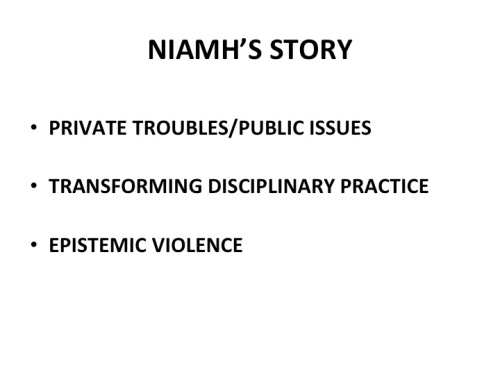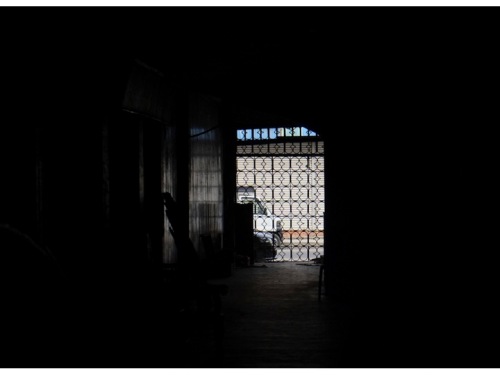The second paper I gave at the Sociological Association of Ireland conference in Belfast recently is an offshoot of my work on the impact of research performance measure on academic practice and identity. The abstract is as below:
What would happen if we viewed Irish higher education through the lens of southern theory. Southern theory argues that dominant epistemologies appear as if from no particular geohistorical location, so pertaining to be universal. Yet, these epistemologies are reflections of and inherent in the imperialism and colonialism of the metropolitan centres of Western Europe and North America. Universal knowledge is, in fact, the imperialism of Europe’s parochialism1&2 and universities have been implicit in epistemic violence as a basis for colonial power3. We need to ask whether, in interpreting Irish higher education, we have simply imported the thematic concerns of the metropole, accepted a subaltern position, and so neglected to develop a unique perspective that takes seriously Ireland as a post-colony4.
What might an Irish sociology of Higher Education look like?
- This sociology would acknowledge that it speaks from somewhere, emerges from a particular geohistorical experience of colonialism, settler colonialism, nationalist nation-building, and globalization;
- It would seek to re-story the history and dynamics of higher education in Ireland from that perspective, working with, beyond, and against the dominant concepts of the metropole;
- It would speak between epistemologies5, critiquing both the continuing coloniality of power and nationalist ideology – an ecology of knowledge6.
1Mignolo, D. (2000) The Geopolitics of Knowledge and the Colonial Difference, South Atlantic Quarterly 101(1): 57–96.
2Quijano, A. (2007) Coloniality and Modernity/Rationality, Cultural Studies 21(2): 168–78.
3Grosfoguel, R. (2013) The Structure of Knowledge in Westernized Universities: Epistemic Racism/Sexism and the Four Genocides/Epistemicides of the Long 16th Century. Human Architecture: Journal of the Sociology of Self-Knowledge 11(1): 73-90.
4Connell, R. (2007) Southern Theory: The Global Dynamics of Knowledge in Social Science. Cambridge: Polity Press.
5Khatibi, A. (1990) Love in Two Languages. Minneapolis: University of Minnesota Press.
6Santos, S. (2014) Epistemologies of the South. Justice against Epistemicide. London: Paradigm.
The paper was presented as a sociological story,
This slideshow requires JavaScript.
-
A BOOK
I open the newly arrived book, running my hand across its cover. I am conscious about how opportune its publication is, arriving when my mind is turned again to considering the political economy of higher education. I am working on a research proposal – how research performance management impacts on academic practice and identity in the more peripheral zones of Europe. Poland, Portugal, Spain, Greece, Iceland, Slovenia, Croatia…Ireland, all buffeted by similar forces of the knowledge economy and globalisation, pushing us to reconsider the purposes and practices of knowledge production and dissemination, of knowledge work itself. These are well-worn tropes, and Simon Marginson is a well-known articulator of how higher education is becoming globalised, how it is being wrenched from its national moorings. As a scholar, I am committed to a notion of knowledge work as a common good. So, the title of Marginson’s new book “Higher Education and the Common Good” is obviously attractive. I know his work, have followed its development over time, informed by his key concepts I have been able to look beyond the immediate actions of managers, beyond the demands I place upon myself to be productive in specific ways, and can see the more general dynamic forces at play in the intimate lifeworlds of my colleagues and friends.
But my reading is disrupted. My assuredness in my epistemological position has ben challenged, has been questioned. I have always been uncertain about the way these texts, these sociologies of higher education, are empty of life, empty of the passions and pain endured by flesh and blood people. I have never been properly able to connect the misery, the excited anticipation of my own heartfelt life as an academic in their people-less words. But this is a different disruption. I read Marginson’s book as if two people. One scans the words, the familiarity of the conceptual framing, and familiarity of the argumentative flow. It describes my world as I have come to experience it. But the other reader focuses in on core words and raises a hand, telling me to pause and consider, consider what perhaps is also being said here, something fundamental.
Although he seeks to provide a long historical and broad geographical view of higher education and its relation to the common good, he admits that the animating model of a globalised higher education is that of the United States. Here he proposes that the idea of mass higher education itself is specifically given by the American history of higher education expansion, noting its beginning in the ‘land grant’ colleges initiated under Lincoln and the subsequent expansion following WW2, and the institutionalisation of America as a global power in part through its universities and colleges.
Although this is the kind of historical narrative I am familiar with, and have been comfortable with, it now disturbs and upsets. In this narrative of America’s internal expansion of higher education there is a complete absence of how America itself and so its system of higher education was founded upon processes of appropriation, dispossession, enslavement and violence.
-
SEMIOTICS
Each morning I pass the original buildings of the university – the quadrangle. Everyone here knows its image, used in all marketing materials, often alongside the newest biotechnology labs. Old and modern in equal measure.
The front cover of the university’s strategic report, Vision 2020, depicts the ‘quadrangle’, a semiotic reminder of Galway’s origins as one of the “Queen’s Colleges”. Without any sense of reflexive pause Vision 2020 notes that the institution was established in the context of the Irish Famine. The running of this statement alongside its corporate text of excellence and achievements should, I feel, cause a pause, a moment of reflection.
In 1845 the foundation stones of Queen’s College Galway were being laid at the edge of the city. From the new Quadrangle building, in 1849, the first intake of 68 students looked out across empty fields and a city ravaged by fear. But, the text reads, the University founders did not allow those challenges to limit their ambitions. Continuing with this heroic narrative the document proclaims that their work began a tradition of scholarship and discovery that would confront the problems of the day, and empower their city and region to prosper. Prosperity on top of misery.
The historic tragedy of the famine becomes, in this institutional document, no more than a marker of heritage. It hides the way imperial epistemologies work. The famine was unique in 19th century Europe and occurred in the centre of the largest empire on earth, amongst those, following the Act of Union, who were UK subjects like those in London, Birmingham, Cardiff or Glasgow. The historical development of Ireland, integrated as it was in the Imperial economy, made it a net exporter of goods, specifically foodstuffs. Consequently, the famine happened in the midst of an expansion of Irish food exports.
-
INTERLUDE
Voices cluster around my ears – Mignolo, Bhambra, Grosfoguel, Anzaldua, Santos, Quijano. These are not the names I am used to in reading and thinking a sociology of higher education.
They plant troubling questions in my mind, make my reading treacherous, unsettling. Their arguments are unfamiliar but potent, persuasive, touching.
Once familiar concepts and frameworks are reworked, rendered fresh by conversation with the liberating vocabulary of my new interlocutors – coloniality of power, empires of the mind, epistemic fundamentalism, border thinking. It is dizzying, fundamental, exciting.
-
ANOTHER BOOK
A different book cover, but a similar set of omissions. Patrick Clancy’s comparative study of Irish higher education is certainly ambitious in its attempt to map the development and expansion of contemporary Irish higher education. He notes how the sector has become a focus for sustained attention following the economic and financial crises. The thesis is now predictable – higher education is being reformed in face of the knowledge economy and globalisation, both economic globalisation and the integration of national economies into global markets, including that of higher education.
Clancy’s narrative is curiously ahistorical. Admitting to a form of methodological nationalism, Irish higher education begins in 1921. The idea of universities being constitutive elements of empire and colonialism, let alone settler colonialism, is absent from the account:
“While universities and other higher education institutions are creatures of the nation state, increasingly analysts feel that a single-country perspective fails to provide an adequate frame of reference for understanding the dynamic of higher education in contemporary societies”
Was it ever the case that higher education in Ireland was not coterminous with a globalisation of power and economy?
Was it ever the case that what might be considered Irish higher education was primarily a construct of the nation state?
ANSWERS?
A) IRELAND AS PART OF A GLOBALISED ECONOMY
There is a specific history of empire that makes sense of the awful condition of famine when a university was founded in Galway, when rampant want and death coexisted with the export of foodstuffs, and the legislated neglect of imperial subjects. It is a history of Ireland’s integration into a British imperial economy as England expanded west, Ireland incorporated into England’s Atlantic Economy that would include the trade in human souls whose surplus value would make possible the American dream of mass higher education. The transformation of a potential independent Irish economy into the producer of foodstuffs specifically to feed imperial expansion, dispossession, and terror. By 1845 the Irish economy could not feed its own people and feed imperial expansion.
B) IRELAND AND IMPERIAL KNOWLEDGE
As well as foodstuffs for Empire, Ireland became the locale for the production of imperial epistemologies, Ireland as part of what Andrew Porter calls EMPIRES OF THE MIND.
– Ireland, simultaneously a partner in the Union and subject nation, supplied large numbers of imperial administrators.
– Between 1855-1863 24% of all Indian civil service recruits were from Ireland because the Queen’s Colleges of Belfast, Cork and Galway had a particular role in supplying administrators to the Indian Civil Service.
Archives can be wonderful places, revealing treasures. One such treasure, presaging the current obsession with performativity, was the 1901 Royal Commission on University Education in Ireland. We see the President of University College Galway defending the performance of the college against sever criticism on the basis of its contribution to the Indian Civil Service
“Galway graduates, for example, were prominent in the Indian medical and engineering services as well as filling various imperial and quasi-imperial positions…”
We can hear these words echoing through the centuries, repeated now in university league tables and parliamentary committees.
-
A PROPOSAL
The construction of an Irish sociology of higher education, as distinct from a sociology of Irish higher education, is not the articulation of a new national(ist) history. While I argue that it is important to understand contemporary political economy of higher education through the lens of Ireland as a post-colony, I do so in order to locate it in broader global networks, and thus not to reify and homogenise the idea of Ireland.
In proposing that we ‘speak from somewhere’, from the condition of Ireland, I speak from the particularity of the West of Ireland. This is not a purely geographical location. The West is a creation of the coloniality of power, a first colony in European Atlantic expansion, caught up in the hegemonic contestation between ascendant Spanish and Portuguese empires. The West is a consequence of Elizabethan and especially Cromwellian dispossession, expulsion and violence that subalternised Ireland and particularly the West – a process continued in numerous ways in the context of a post-colony.
Ramon Grosfoguel notes that,
“The Western/masculinist idea that we can produce knowledges that are unpositioned, unlocated, neutral, and universalistic is one of the most pervasive mythologies in the modern/colonial world”
Instead, we need to account for the geopolitics of our knowledge production. Inherent in this proposition is the suggestion that thinking Irish higher education otherwise is a project of epistemic decolonisation.
Bibliography
Ballantyne, T. (2005) ‘The Sinews of Empire: Ireland, India and the construction of British colonial knowledge’, in Terence McDonagh (Ed) Was Ireland a Colony? Economics, politics and culture in nineteenth-century Ireland. Dublin: Irish Academic Press.
Clancy, P. (2015) Irish Higher Education: A Comparative Perspective. Dublin: Institute of Public Administration.
Connell, R. (2007) Southern Theory: The Global Dynamics of Knowledge in Social Science. Cambridge: Polity Press.
Grosfoguel, R. (2013) The Structure of Knowledge in Westernized Universities: Epistemic Racism/Sexism and the Four Genocides/Epistemicides of the Long 16th Century. Human Architecture: Journal of the Sociology of Self-Knowledge 11(1): 73-90.
Khatibi, A. (1990) Love in Two Languages. Minneapolis: University of Minnesota Press.
Marginson, S. (2016) Higher Education and the Common Good. Melbourne: Melbourne University Press.
Mignolo, D. (2000) The Geopolitics of Knowledge and the Colonial Difference, South Atlantic Quarterly 101(1): 57–96.
Mignolo, W., D. and Tlostanova, V. (2006) Theorizing from the Borders: Shifting the geo-and body politics of knowledge. European Journal of Social Theory, 9(2): 205-221.
O’Hearn, D. (2005) ‘Ireland in the Atlantic Economy’, in Terence McDonagh (Ed) Was Ireland a Colony? Economics, politics and culture in nineteenth-century Ireland. Dublin: Irish Academic Press.
Quijano, A. (2007) Coloniality and Modernity/Rationality, Cultural Studies 21(2): 168–78.
Santos, S. (2014) Epistemologies of the South. Justice against Epistemicide. London: Paradigm.
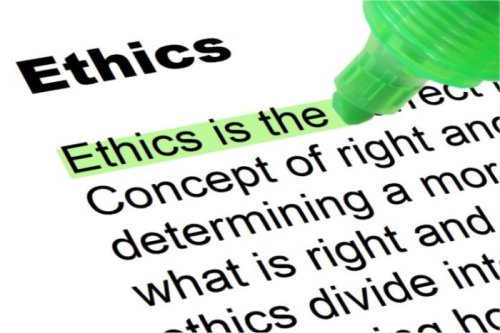



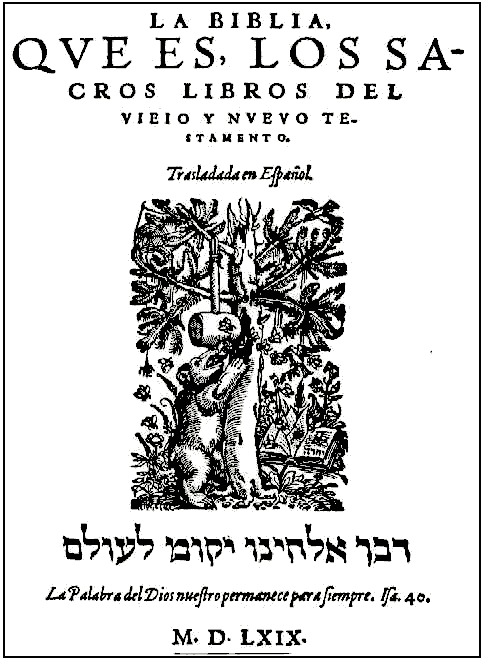
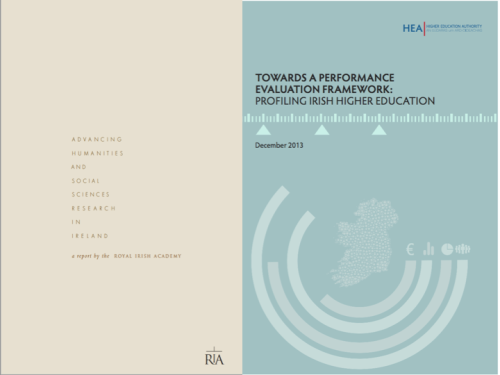
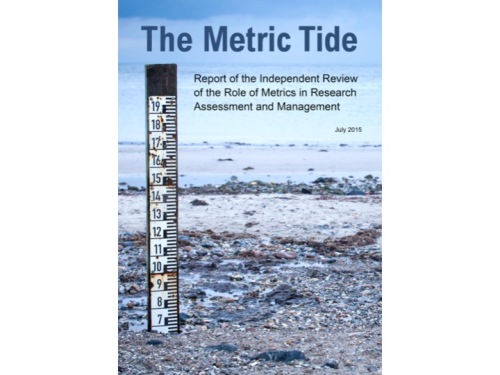
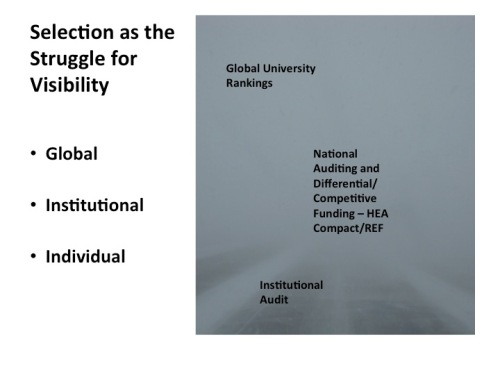 We are all fairly familiar with key features of the global higher education landscape as it relates to research selectivity. We can conceive of research selectivity as a site for struggles over external and internal visibility, particularly for semi-peripheral higher education systems and for more peripheral disciplines.
We are all fairly familiar with key features of the global higher education landscape as it relates to research selectivity. We can conceive of research selectivity as a site for struggles over external and internal visibility, particularly for semi-peripheral higher education systems and for more peripheral disciplines.